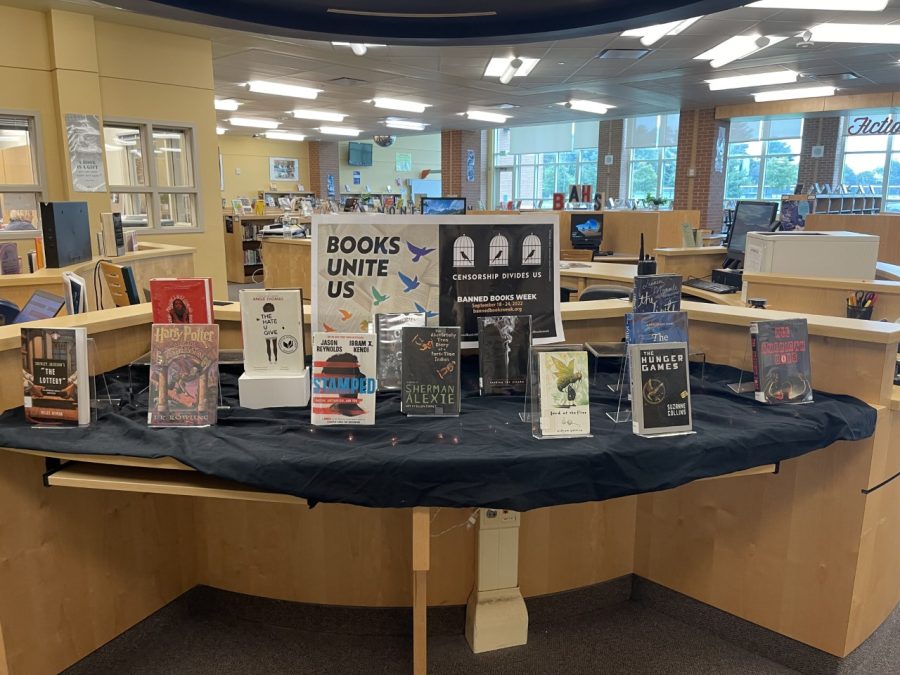Book Banning Steals Student Freedoms
May 12, 2023
Through July 1st, 2022 -December 1st, 2022, data from PEN America found that 874 different book titles have been banned from public schools in America. In my opinion, a book that is banned is a book that needs to be read. Let’s break down the agenda.
While books can have some dark or explicit content, readers find comfort in reading about scenarios in which they have been in as well or are similar to the world around them. PEN America found that:
- 44% of the subject matter of banned content included themes or storylines of violence and physical abuse
- 38% included content of health and wellbeing for students
- 30% had themes of grief and death
- 30% with characters of colors or themes of race and racism
- 26% had LGBTQIA+ characters or themes
- 24% included sexual experiences between characters
- 17% mentioned teen pregnancy, abortions or sexual assault
Though some of these topics can be hard for people to discuss at times, that does not mean they aren’t worthy of a conversation. People describe books as an escape from reality and a place to find comfort. Readers want to read books that they can confide in and find a story like their own.
Bel Air High School 10th grade Honors English and 11th grade AP English Language Composition teacher Ms. Christin Orth described books as “mirrors” and “windows”: “I have heard books described as both windows and mirrors. Windows into worlds that we might not otherwise experience and mirrors that encourage self-reflection. To me, the saddest part of book banning is the fact that people will be denied both “window” and “mirror” opportunities to empathize with others and to grow as individuals. When you think about it though, doesn’t banning something make it more interesting and spark curiosity about it? I’m pretty sure book banning’s are not as effective as those banning books would like them to be!”
Ms. Orth brings up a great point though! Does banning a book truly prevent it from reaching a student’s hands or does it just prevent easy access to it?
The top 11 most banned books in the first half of this school year are:
- “Gender Queer: A Memoir” by Maia Kobabe (15 bans)
- “Flamer” by Mike Curato (15 bans)
- “Tricks” by Ellen Hopkins (13 bans)
- “The Handmaid’s Tale: The Graphic Novel” by Margaret Atwood (12 bans)
- “Crank” by Ellen Hopkin (12 bans)
- “Sold” by Patricia McCormick (11 bans)
- “Push” by Sapphire (11 bans)
- “A Court of Mist and Fury” by Sarah J. Maas (11 bans)
- “This Book Is Gay” by Juno Dawson (10 bans)
- “The Bluest Eye” by Toni Morrison (10 bans)
- “Milk and Honey” by Rupi Kaur (10 bans)
Last year, in 2021, the most challenged book was also “Gender Queer: A Memoir” by Maia Kobabe, but some other well-known titles include “The Hate U Give” by Angie Thomas and “The Absolute True Diary of Part-Time Indian by Sherman Alexie. Alexie’s novel, and Thomas’, are currently part of the HCPS 9th grade curriculum. Alexie’s book was banned for profanity, sexual references, and use of derogatory terms.
Author Rupi Kaur, whose poetry book made this year’s list, expressed that “it deeply concerns me that there is a group of people hell bent of taking away literature that students find refuge in. parents want to ban books to protect their kids. but teachers and librarians say that students are old enough to be aware of the topics discussed in these books. many actually seek these books out because they’re going through those experiences themselves.”
Speaking on her own high school experience with books, Kaur went on to explain that she remembers “sitting in my school library […] turning to books about sexual assault because i didn’t have anyone else to turn to […] now that books about sexual assault and other topics are being banned- i worry for students who rely on school libraries for access to literature.” ‘Milk and Honey’ was banned for content of sexual assault and violence experienced by young women.
“Fahrenheit 451” by Ray Bradbury is part of the HCPS Curriculum for 10th grade students. The story is about censorship itself when protagonist Guy Montag, who lives in a dystopian society of oppression that tries to eliminate all ways that people could have a further education to ensure equality, goes from a book-burning fireman to a rebellious book reader. “Fahrenheit 451” is continuously challenged by states for having “graphic” content.
Ms. Orth, who teaches this book in her classroom, explained “the absolute irony of Fahrenheit 451 being banned is not lost on me. In Fahrenheit 451, Bradbury warned readers of a world in which books would be made illegal and technology addiction, ignorance, apathy, and loss of hope would prevail. Sounds eerily familiar. The message of Fahrenheit 451 is more relevant today than ever before and that message far outweighs any “graphic content” in the book. And I’m sorry, but what “graphic content”? I can’t think of a part of that book that is “graphic”–Beatty’s death maybe? I’m stumped.” Personally, I feel that anyone attempting to ban this book needs to read it themself.
I think the most important thing about books is that no matter the subject matter, we have the opportunity to exercise our minds and escape. It is completely disheartening to hear that so many books that I’ve read and loved will no longer be available for students in their school libraries. Bel Air High School Librarian Ms. Holly Olive’s point view is that “book banning conflicts with students’ first amendment rights to receive and express ideas. Historically, book challenges and book banning have been related to sexually explicit content, however more recently books are being challenged or banned due to ideas related to LGBTQIA+ and racial issues. Every student deserves to see themselves in the books they read and feel welcome in their school library space. Unfortunately, book banning works against those goals and further alienates underrepresented students.”
So many students rely on their school libraries as a free resource for their literature and expression. We can’t keep pretending like things don’t happen in the world by attempting to hide the truth that is revealed through books. The great Irish poet Oscar Wilde said it best: “The books that the world calls immoral are books that show the world its own shame.” We live in a time of blossoming media where everything and anything can be found on the internet, so why are people so afraid of books?
I believe it’s because people cannot understand things they have not personally been through. They have a fear of the unknown, one that authors have continuously, time and time again, have not been afraid to touch. They choose to hide hard things and advanced concepts because it’s easier to avoid them than to have the conversation. But we NEED to have these conversations. We need to let our children LEARN.
Meg Medina is an American children’s author and activist for books to be able to be read by all people. She writes books to celebrate Latino culture through her own Cuban descent. Medina highlighted that “to pull books from a school library because of the discomfort they create in adults is a recipe for disaster. It erodes the trust young people have in the adults in their lives and pushes them to secrecy. It undermines the studied opinion of professional librarians and educators. It supports a false idea that there is one version of life that is acceptable. And it denigrates the work of authors who are brave enough to name experiences that are difficult and real.”
Students should be in charge of the responsibility to exercise their own minds. While I can appreciate a student deciding that a book’s content may not be fit for themself, that is a personal decision. What I choose to read is my choice and should be my choice only. It is MY right to read. Literature changes lives and we are better as a society because of it. We are better as society when we know the truth, whether it’s the darkest topics or the lightest. We are better as a society when we trust the judgement of our own children. We are better as a society when we encourage our children to learn and read, letting them escape into realities far or close to home. We are better as a society when we allow our children to ask questions and encourage them to do so, and we are better as a society when instead of conforming to one ideal of life, we create our own agendas, agendas that are encouraged and released through books.
Yet the question still remains, why does what I read affect anyone other than myself? Truthfully, it does not. Book bans may try to censor our ability to learn about new things, thoughts, or ideas, but they just make us more curious. As the government tries to take away our freedom to read what we choose, I encourage people to read the books they deem “unfit” for our minds. Reading is for those willing to let their minds run wild through stories, and if you don’t want to read them, then don’t. Taking away books from school libraries does not stop the ones who truly want to read them, instead it encourages them to break the barriers and read more.


